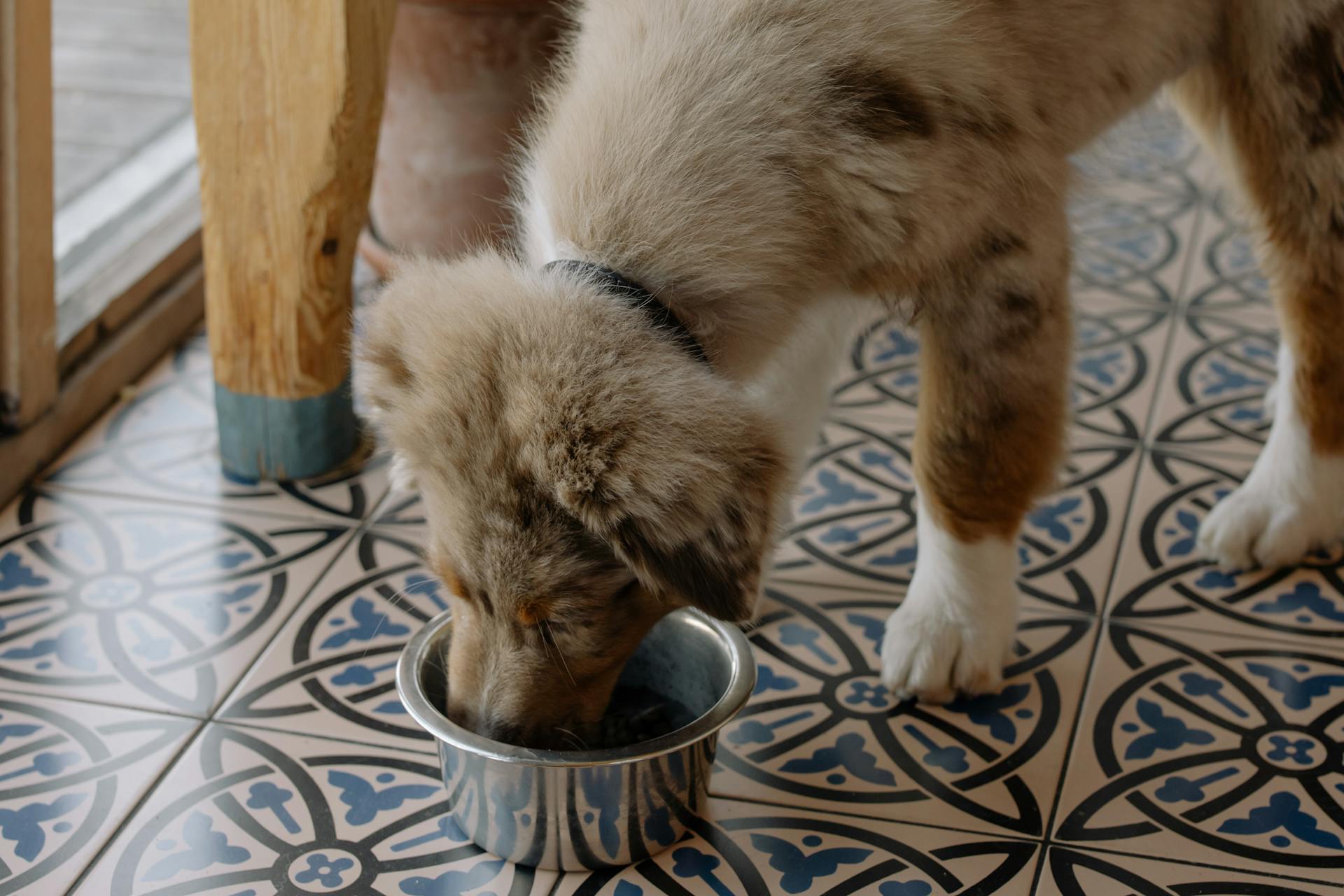
Dogs can indeed get diarrhea from overeating, and it's often caused by eating too much food in one sitting. This can put a strain on their digestive system.
Eating too much food at once can cause stomach upset in dogs, leading to diarrhea. A dog's stomach can only handle a certain amount of food at a time, and overeating can push them past that limit.
Some common culprits behind overeating in dogs include free-feeding, where dogs are left to graze throughout the day, and table scraps, which can be high in fat and other indigestible ingredients.
On a similar theme: Dogs Stomach Making Noises and Not Eating
Causes of Diarrhea
Dogs can get diarrhea from eating a variety of things, including table scraps, garbage, and spoiled food. This can happen when they ingest something that's not good for them, like a new food or a toxic substance.
Some common causes of diarrhea in dogs include intestinal parasites, bacterial infections, and food allergies or sensitivities. These can cause the intestines to move too quickly, leading to loose, runny, or unformed stool.
Worth a look: Dubia Roaches Eat Dog Food
Dietary indiscretion, or eating something they shouldn't, is a major contributor to diarrhea in dogs. This can happen when they get into the trash or eat something from the ground during a walk.
Here are some common causes of diarrhea in dogs:
- Eating garbage or spoiled food
- Medications such as antibiotics
- Intestinal parasites (such as giardia)
- Bacterial infections
- Food allergies and sensitivities
- Dietary indiscretion (eating table scraps, garbage, or something from the ground during a walk)
Stress, such as boarding, traveling, or a big change at home, can also cause diarrhea in dogs. This is because stress can affect the digestive system and make it harder for the intestines to absorb water and nutrients.
Pancreatitis, or inflammation of the pancreas, can also cause diarrhea in dogs. This is a serious condition that requires veterinary attention.
Dietary Factors
Eating the wrong thing can cause diarrhea in dogs, and it's not just about what they eat, but also how much. Dietary indiscretion, or eating something they shouldn't have, is a common veterinary diagnosis.
Rich or fatty foods can cause stomach upset, leading to vomiting, discomfort, and diarrhea. I've seen it happen to my friend's puppy after a barbecue, and it's not a pretty sight.
Some foods, however, can actually help alleviate diarrhea in dogs. Foods like white or brown rice, rice water, yogurt, canned pumpkin, and certain herbs like fennel can be gentle on their stomachs and help them recover.
A unique perspective: Dogs Eat Jasmine Rice
Dietary Indiscretions

Dogs love to put their mouths on anything and everything, which can lead to dietary indiscretions, a common veterinary diagnosis.
Eating the wrong thing can cause diarrhea in a couple of different ways, including eating rich or fatty foods that can cause stomach upset.
Puppies may vomit or appear uncomfortable as well as having diarrhea after eating an excessive amount of rich or fatty foods.
If your puppy has eaten something toxic, contact an animal poison helpline such as the ASPCA Poison Control Center or the Pet Poison Helpline, (855) 764-7661, immediately.
Even nontoxic non-food items can be problematic if they get stuck in your puppy's gastrointestinal tract and cause a blockage.
Dogs are scavengers and love to eat things that don't belong to their intended diet, which can lead to digestive upset and diarrhea.
A sudden change in your dog's diet, such as switching to a new food without a gradual transition period, can cause diarrhea.
Dogs have a fondness for eating garbage, table scraps, and other human snacks, which can lead to digestive upset and diarrhea.
In many cases, the diarrhea will resolve itself in a day or two, but if you believe your dog has eaten something poisonous, see your veterinarian immediately.
Discover more: Stop Eating Dog Food
Add Some Fiber
Adding fiber to your dog's diet can be a game-changer for their digestive health. Inulin or psyllium husk powder can help absorb excess water in the large intestine to form more solid stools.
These fiber supplements also act as prebiotics, supporting your dog's digestion by nourishing the beneficial bacteria that live in the colon. This is especially important for maintaining a healthy gut.
FOS (fructo-oligosaccharides) is another prebiotic that can be added to your dog's food to feed beneficial bacteria in the gut, improving both gut health and immune functions.
Symptoms and When to Seek Help
If your dog has had a single episode of diarrhea but is otherwise acting normal, it's likely not a cause for concern. However, if your pup experiences two or more bouts of diarrhea, it's a good idea to contact your vet.
Recurring bouts of diarrhea over a short period of time can be a sign of a serious health issue, especially in very old, very young, or dogs with a compromised immune system. Infections like parvovirus are extremely serious, contagious, and life-threatening.
Dogs showing other symptoms as well as diarrhea should be seen by a vet as soon as possible. These symptoms include lack of appetite, blood in stool, signs of dehydration, unusual drooling, weakness, and vomiting.
Here are some signs to look out for that may indicate your dog needs veterinary attention:
- Lack of Appetite
- Blood in stool
- Signs of dehydration (Sunken dry-looking eyes, dry nose, or dry, sticky gums)
- Unusual drooling
- Weakness
- Vomiting
If your dog is displaying any of these symptoms, contact your veterinarian right away. Your vet will let you know whether your pet's symptoms indicate that an examination is necessary.
Treatment and Prevention
If your dog is experiencing diarrhea, it's essential to take action to help them recover. Your veterinarian may prescribe medication such as metronidazole or tylosin to help normalize the G.I. tract and stop the diarrhea.
A bland diet, such as plain boiled chicken or rice, can also be beneficial in giving your dog's digestive system a break. Probiotics intended for use in dogs can be a helpful addition to this diet.
To prevent diarrhea in the first place, it's crucial to keep your pup up to date on all routine care, including vaccines and parasite prevention. You should also block access to garbage, avoid feeding table scraps, and gradually introduce new dog foods to prevent digestive upset.
Here are some foods that can help dogs with diarrhea, once their symptoms have resolved:
- White or brown rice
- Rice water
- Yogurt
- Canned pumpkin
- Cottage cheese
- Boiled potatoes (without skin)
- Chicken (without skin)
- Eggs
- Certain herbs like fennel
Remember, if your dog's diarrhea persists or is accompanied by other symptoms, it's always best to consult with your veterinarian for proper guidance and treatment.
Medication Side Effects
Some medications can cause diarrhea as a side effect. Antibiotics are one such example, which are used to treat bacterial infections, but can also disrupt the balance and diversity of your dog's gut flora.
If your vet prescribes antibiotics for your dog, be aware that they can kill off other beneficial bacteria in the gut, leading to antibiotic-associated diarrhea.
A probiotic supplement like S. boulardii can help reduce and even prevent antibiotic-associated diarrhea. This is a key ingredient in DoggyBiome's S. boulardii + FOS supplement.
Some medications used to treat diarrhea in dogs, such as metronidazole and tylosin, can have side effects like stomach irritation and vomiting. Your vet will monitor your dog's condition and adjust the treatment plan as needed.
Here are some common medications that can cause diarrhea as a side effect:
- Antibiotics
- Chemotherapeutic drugs (if the diarrhea is caused by cancer)
Remember, it's always best to consult with your vet before giving your dog any medication, even if it's an over-the-counter medication that you think might help with their diarrhea.
Preventing
Preventing diarrhea in dogs is just as important as treating it. A healthy gut microbiome is crucial for your dog's overall well-being. You can help maintain a balanced gut by feeding a high-quality, balanced diet.
Feeding table scraps is a big no-no, as they can be difficult for your dog to digest. Avoid giving your dog fatty, creamy, or spicy foods, as they can irritate their stomach. If you need to change your dog's food, do it gradually over 1-2 weeks to prevent digestive upset.

Regular deworming is essential to prevent parasite-related diarrhea. Pick up all dog poop promptly to prevent the spread of bacteria and parasites. Keeping your yard free of toxic plants and keeping human foods out of reach can also help prevent diarrhea.
Here are some additional tips to prevent diarrhea in dogs:
- Make diet changes gradually over several days
- Avoid feeding table scraps
- Follow a regular deworming schedule
- Pick up all dog poop promptly
- Keep your puppy crated when unsupervised to prevent her from eating something she shouldn't
- Keep human foods out of reach
- Only use dog-friendly plants in your yard and keep toxic houseplants out of reach
- Don't skip or delay any part of the puppy vaccination schedule
- Avoid unvaccinated dogs until your puppy is fully vaccinated
Specific Situations
Eating too much food, especially high-fat or high-fiber foods, can cause a dog's digestive system to become overwhelmed, leading to diarrhea.
Feeding a dog a large meal before a walk can be particularly problematic, as the dog may not have time to digest the food properly before exercising.
If your dog has eaten a large amount of fatty foods, such as table scraps or treats, it can take up to 24 hours for symptoms of diarrhea to appear.
In some cases, eating too much food can also cause a dog to experience vomiting, which can further exacerbate diarrhea symptoms.
On a similar theme: Can Dogs Get High from Eating Pot Leaves
Parasites and Pathogens
Puppies are especially vulnerable to intestinal parasites like Giardia, tapeworms, hookworms, roundworms, and whipworms, which can cause diarrhea.
These parasites can be transmitted through poop, and you might be able to see them as white specks or grains in your puppy's stool.
Some parasites, like roundworms, can also be transmitted from mother to puppies through the placenta.
To prevent diarrhea, keep up-to-date with your puppy's monthly antiparasitic treatments.
Regular deworming is crucial, especially for puppies, as they can reinfect themselves from their own poop if the environment isn't properly cleaned.
Your veterinarian can check your puppy's stool for worm eggs and other parasites, and prescribe the best deworming medication once the offending parasite is identified.
A different take: Dog Eating Frozen Dog Poop
Inflammatory Bowel Disease (IBD)
Inflammatory Bowel Disease (IBD) is a condition where chronic inflammation in the GI tract interferes with food processing and nutrient absorption.
This can lead to diarrhea, vomiting, and loss of appetite, which can last for more than three weeks.

The gut microbiome is disrupted, with some bacterial populations growing too large and taking resources away from "good" bacteria.
More than 50% of dogs with IBD respond to a diet change alone.
Fecal microbiota transplant (FMT) can also correct the bacterial imbalances in the gut microbiome associated with IBD.
Oral FMT capsules, such as DoggyBiome Gut Restore Supplement, can be used to restore the balance of beneficial bacteria in the gut.
Lactating Mother
If your dog is a new mother, nursing puppies can be a cause of diarrhea due to the tremendous amount of calories she needs to take in to produce nutrition for her puppies.
This increased energy demand is the single greatest energy demand a dog experiences, and it can lead to changes in her digestion.
As a result, it's essential to encourage her to drink plenty of water to help her stay hydrated and support her lactation.
Supplementation with the probiotic yeast Saccharomyces boulardii may also be helpful in resolving diarrhea that arises after whelping.
Veterinary Care and Advice
If your dog has diarrhea and the home remedies don't help, it's essential to see a vet. They will ask about your dog's health history, how long they've had diarrhea, and any clinical signs you've noticed.
If your dog shows other signs like vomiting, lethargy, weakness, fever, or dry or pale gums, you should seek veterinary care immediately. This is because diarrhea can be a symptom of a more serious underlying condition.
The vet may run tests such as fecal flotation, Parvo testing, or complete blood count to narrow down the possible diagnoses. They may also order X-rays or ultrasound to check for evidence of obstruction, cancer, or inflammatory bowel disease.
Here are some situations that require immediate veterinary attention:
- If the home remedies don't help and diarrhea lasts for more than three days;
- If your dog shows other clinical signs like vomiting, lethargy, weakness, fever, dry or pale gums, etc.;
- If they use medications like antibiotics;
- If they are old or suffer from certain conditions like diabetes, cancer, or Cushing's disease.
When to See the Vet
If your dog has had a single episode of diarrhea but is otherwise acting normal, it's likely not a cause for concern. However, more than two episodes might be a sign of a health problem, so it's a good idea to contact your vet if your pup experiences two or more bouts of diarrhea.
If your dog is straining to pass a stool but only passing small amounts of watery diarrhea, it could be a sign of a painful blockage due to the ingestion of a foreign object.
Recurring bouts of diarrhea over a short period of time can be a sign of a serious health issue, particularly if your pup is very old, very young, or has a compromised immune system.
If your dog shows other symptoms as well as diarrhea, such as lack of appetite, blood in stool, or signs of dehydration, contact your vet right away.
Here are some signs to look out for:
- Lack of Appetite
- Blood in stool
- Signs of dehydration (Sunken dry-looking eyes, dry nose, or dry, sticky gums)
- Unusual drooling
- Weakness
- Vomiting
If your dog is displaying any of these symptoms, contact your veterinarian to schedule an appointment.
If your puppy has diarrhea, keep a close eye on them as it can be a sign of a serious health condition such as intestinal parasites, exposure to dangerous bacteria, or parvovirus.
If the home remedies don't help and diarrhea lasts for more than three days, or if your dog shows other clinical signs like vomiting, lethargy, weakness, fever, dry or pale gums, etc., it's absolutely necessary to see the vet.
Here are some common tests used by vets to help narrow down the list of possible diagnoses:
If your dog has diarrhea, it's always better to err on the side of caution and consult with your vet to rule out any serious health issues.
Puppy Vomiting
Puppy vomiting can be a scary and concerning symptom, but it's essential to know that it's not always a cause for alarm. Vomiting in puppies can be a sign of a minor issue or a more serious problem that needs immediate attention.
If your puppy is vomiting, it's crucial to monitor their behavior and watch for other symptoms like diarrhea, which can lead to dehydration. Dehydration can cause permanent damage to your puppy's internal organs in a matter of days.
If your puppy's vomiting persists or is accompanied by other concerning symptoms, it's always best to err on the side of caution and consult with your veterinarian. They can provide you with personalized advice and help you determine the cause of the vomiting.
Suggestion: Senior Dogs Eat Puppy Food
Intestinal Blockages Are Hazardous
Intestinal blockages are a serious concern for dog owners. They can cause a range of health issues, from mild to life-threatening.
If you suspect your dog has ingested a foreign body, such as a toy or rawhide chew, seek veterinary attention immediately. This is because materials that can't be digested have the potential to create a blockage in the gastrointestinal tract.
A blockage can interfere with the motility of the digestive system, causing tissues near the obstruction to stretch and become inflamed. This can lead to liquid stool seeping around the blockage.
Rawhide chews can sometimes cause blockages, especially if your dog swallows them whole instead of chewing them sufficiently.
Gut Health Testing
Gut Health Testing is a crucial step in understanding what's going on in your dog's digestive system. It can help identify the root cause of diarrhea symptoms and track specific pathogens over time.
More than 50% of all dogs will suffer from a medical condition related to a gut microbiome imbalance at some point in their lives. This is a staggering statistic, and it highlights the importance of regular gut health testing.
Gut microbiome testing can determine whether different bacterial populations are present in appropriate, balanced amounts compared to healthy dogs. This is crucial for maintaining a thriving, well-balanced microbiome.
A Gut Health Test can even offer clues about the underlying reason for a dog's diarrhea. For example, low levels of Coprococcus and Oscillospira bacteria in the gut are often observed in dogs with food allergies.
The latest report for DoggyBiome's Gut Health Test contains modules that offer targeted detection of specific pathogens and beneficial bacteria in dogs. This helps dog parents get to the root cause of their dog's diarrhea symptoms.
By identifying imbalances in the gut microbiome, you can take targeted steps to restore a healthy balance. For instance, if the test shows a deficiency in Fusobacterium, increasing the protein content of your dog's diet may help.
Sources
- https://www.fallsroad.com/site/tips-resources-blog-baltimore-vet/2021/10/12/diarrhea-dogs
- https://www.dailypaws.com/dogs-puppies/health-care/puppy-care/puppy-diarrhea
- https://www.pawlicy.com/blog/diarrhea-in-dogs/
- https://bondvet.com/b/dog-diarrhea-causes-and-treatment
- https://shop.animalbiome.com/blogs/pet-health/dog-diarrhea-what-you-need-to-know
Featured Images: pexels.com


